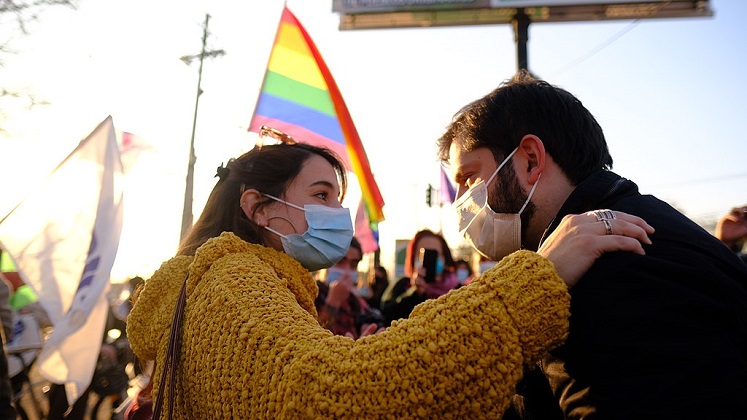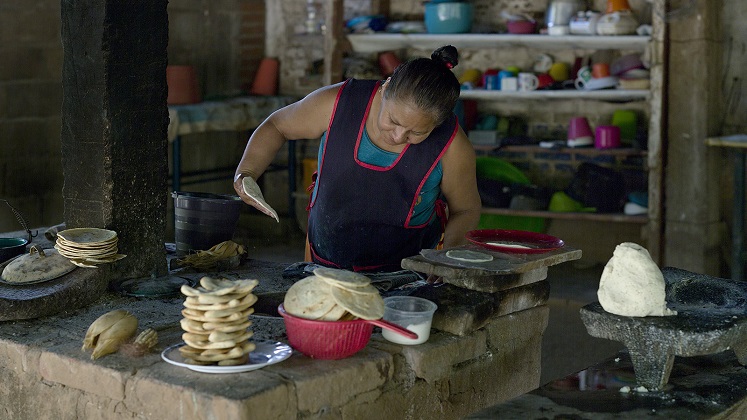Trinidad and Tobago has the highest per capita rates of Venezuelan migrants in the world. A group of Venezuelan women have decided to face the challenges of displacement with entrepreneurship and togetherness, as Sebastian Alsina (LSE) found
Only seven miles away from the coast of Venezuela, the dual-island nation of Trinidad & Tobago (TT) has seen an estimated 40,000 Venezuelans arrive in recent years. Migrants arrive predominately via irregular means, crossing the hazardous Bocas del Dragón to escape Venezuela’s deep socio-economic crisis. Despite this figure being substantially lower than that of other nations in the region, the islands’ small land area and population of 1.4 million inhabitants make it the highest per capita recipient of Venezuelans in the world. In response, the Trinidadian government has registered an estimated 16,400 migrants yet refused to incorporate the Refugee Convention into domestic law, habitually breaching the non-refoulement principle. Over 200 Venezuelans were forcefully deported in December 2021 alone, whilst the coastguard opened fire on arriving vessels, resulting in the death of a nine-month-old child earlier this year.
As part of a broader thesis, this research used the first-hand accounts of fourteen Venezuelan refugee and migrant women in Trinidad and Tobago to highlight a side of the ongoing displacement crisis rarely discussed, the motivations and resources used by Venezuelan entrepreneur women in the face of dire circumstances. Entrepreneurship is seen as an attempt to overcome government side-lining, previous exploitative working conditions, and the constant threat of deportation through the mobilisation of social media and cultural capital. The establishment of an all-female entrepreneurial network provides a ballast of emotional support and hope, pushing back against xenophobia and stereotyping.
Entrepreneurship to fight precariousness
The overarching lack of legislation afforded by the Trinidadian government to provide long-term protection for displaced Venezuelans is a source of ongoing fear and a daily barrier, with imprisonment for indefinite periods seen as nothing out of the ordinary. Interviewees recounted being stopped arbitrarily and having to pay substantial release fees, whilst mass deportations only served to cement these fears. Media reports of Venezuelan women being attacked and raped were judged a result of the government’s vehement refusal to grant work permits and driving licences to Venezuelan arrivals, forcing women to use unmarked taxis or walk great distances after work.
The exclusion of undocumented Venezuelans from public education forces many to stay at home to provide care for their children. The owner of a small children’s party business and mother of two summarises some of these key challenges as she struggles despite having been granted official ‘refugee’ status by UNHCR (United Nations High Commissioner for Refugees).
“If we want to open a bank account, they won’t let us. We can’t drive a car; we don’t have access to a driving licence. We don’t even have permission to be here in Trinidad […] I have a six-year-old daughter, and she can’t go to a state school because she doesn’t have Trinidadian nationality […] you have no right to anything, you can’t earn a good salary, you can’t work, you can’t keep your career, you can’t open a bank account. Everything is ‘No, no, no!’”
Despite having previously held jobs in accounting, finance and law, a lack of credential recognition means qualifications are “a worthless piece of paper”, whilst the combination of an Anglophone nation and the presence of an unfamiliar Trinidadian accent serves as a further barrier to the job market and wider integration. Upon their initial arrival in TT, these women thus found jobs in bars, supermarkets, and factories, where they faced extensive exploitation due to labour market barriers. Another woman, who was a trained lawyer in Venezuela, recalled working in an egg factory with no days off, receiving an hourly wage of just 10 TTDs (£1.23). Xenophobia from customers is a common fixture, with women recounting being branded mujeres de mala vida(women of bad morals/prostitutes) and being accused of stealing the husbands of Trinidadian women.
The Ethnic Enclave Strategy
A small-scale business paying in cash thus surfaced as an ideal strategy for generating sufficient income and affording some independence. The lawyer turned factory worker, for instance, has channelled all her savings, $400 (USD), into the creation of a small beauty business. Another woman, a former computer engineer, describes, “I was working in a supermarket, and the exploitation was too much, until I said, ‘That’s enough! I’m going to see what I can do for myself!’”, mirroring the decision of all respondents to become independent traders, operating as manicurists, hair stylists, children’s party organisers or balloon decorators.
Countering previous findings of gender gaps in the use of information and communications technology by immigrant entrepreneurs, these business owners integrate social media to produce short videos and brightly coloured posts, showcasing their services at very little cost. Facebook, TikTok and Instagram provide most of the clientele since they can present their work to other Venezuelans and form a ‘protected market’. In turn, these businesses operate as vehicles of resilience, run from home and outside the purview of the state, ensuring a safe and steady source of revenue, particularly vital during island-wide Covid-19 lockdowns and periods of heightened deportations.
Attempts to ‘Break out’
Several respondents also demonstrated attempts to break out beyond the enclave economy, offering promotions aimed at undercutting competition and attracting Trinidadian customers. For example, a hairstylist offers free waxing with every purchase, alongside Venezuelan and Trinidadian hairstyles, posting these unique promotions in both English and Spanish. Gradually attracting more and more Trinidadians, her low-operating costs enable her to side-step competition, affirming the strategies of another woman, who posits, “We can offer the same work as a Trinidadian but at less cost. That’s why people prefer us because my pricing is going to be 50% less than a Trinidadian’s.”
Despite language barriers, women entrepreneurs find strategies to keep their businesses open. “When the parties are in English, I practice English a week before, and I create a draft to know what I’ll say.” This script gives this children’s party organiser access to Trinidadian clientele, incrementally expanding her reach and building on her accompanying patch-working strategies, diversifying activities within her one business. Starting with a small art station, she has reinvested her profits to diversify her offerings. In turn, she has gained a leg-up on competition and branched out to obtain a similar number of Trinidadian customers to Venezuelans.
Countering negative stereotypes: “I want them to know what Venezuelan women are really like”
The establishment of the group ‘Venezuelan Female Entrepreneurs’ (pseudonym) in 2020 is a further method used by these women to counter the ‘triple jeopardy’ faced. Aspiring to one day provide business and language classes to other Venezuelan women, this network currently serves to gather similar experiences of government abuse whilst challenging xenophobia. The group’s founder, a balloon decorator, says, “I want them [Trinidadians] to know what Venezuelan women are really like […] Not as prostitutes or here to do harm,” slating media depictions of Venezuelan women as the source of male infidelity and family disintegration.
Meanwhile, members express an immense obligation to other Venezuelan women, attempting to rebrand their overall image by highlighting their talented and hardworking ethics. As one interviewee says, “We are not here to do evil; we come to do good. We want to be an example for the whole of Latin America.” Remaining in contact via WhatsApp and Facebook and meeting once a week in a member’s house, participation provides an opportunity to gain mutual support and advice from one another. Despite operating in the same highly competitive industries, the most experienced entrepreneurs share business hacks, such as how to set up online payment systems and manage social media platforms, whilst other members watch tutorials together and share contacts of potential clients.
In the face of shared hardship, these women have merged to counter-dominant systems of representation, offering a bottom-up counter-narrative to homogenous depictions of Venezuelans whilst overcoming cultural fixities that deem entrepreneurship as masculine. In turn, by endeavouring to appear as mothers, wives, sisters and friends, they actively challenge boundaries of belonging and perceptions of Venezuelans as ‘eternal newcomers’. And despite its relatively recent formation, they are frequently featured in Trinidadian newspapers.
With entrepreneurship able to generate income and knowledge transfer for immigrants whilst potentially providing host country economic growth, these findings stress the need to overcome a general propensity towards underscoring the victimhood of Venezuelan women at the expense of their heterogeneity. Instead, support for Venezuelan migrant entrepreneurs in host countries should be ensured to ease socioeconomic adaptation and progress. The need for recipient states such as Trinidad & Tobago to guarantee the rights of Venezuelan arrivals and provide vital residence and work permits remains. And on a broader scale, this must be accompanied by an enhanced effort by OECD nations to provide cohesive support for those nations facing Latin America’s largest displacement crisis in modern history.
Notes:
• The views expressed here are of the author rather than the Centre or the LSE
• This post is based on a dissertation submitted on August 10th 2022, for the LSE MSc in International Migration and Public Policy
• Please read our Comments Policy before commenting
• Banner image: Welcome To Trinidad and Tobago / formulanone (CC BY-NC-SA 2.0)






You do not give credit to the local population for being tolerant of a population that is 30 million strong and historically hostile to Trinidad and Tobago.Why do you write as though Venezuelans have the right to be here?? This is an English speaking nation and yet dynamics and cultural diversity of my country is being negatively impacted . We are not the United States nor are we some European country. These people were given 1 year to stay legally and work instead you come up with this story and forgetting that we have LAWS.Venezuelans are demanding rights which from my perspective can only be confirmed through birth, descent or naturalization.So ASK YOURSELF where are rights of the citizens of this twin island state??Do we give into your rants and raves??They are economic refugees not political asylum seekers. There are enough problems trying to find spaces for our own children to go to school..60,000-100,000 foreigners are a pressure on a free health care system. Housing transportation jobs are all under strain because they are displacing an already depressed working class and poor of this country. Yet we as a people have not rioted in our streets but our courts are dealing with this issue .An illegal immigrant will be deported..This nation will not become a mini Venezuela or a Venezuelan colony..You have a CONTINENT stay on it..What you do not write is the fact that the Venezuelans are encouraging HUMAN TRAFFICKING and this joke of a story does not show the dark side of their statement “We can offer the same work as a Trinidadian but at less cost. That’s why people prefer us because my pricing is going to be 50% less than a Trinidadian’s. They are causing a drop in wages and work for money far less than what can reasonable sustain a family. This is a pool of economic slave labour. Trinidadians are not interested in Venezuelan women there have been too many instances of fraud by these women resulting in Trinidadian men murdering these women for their deception..So the fad of their presence has given away to a dark reality ..They are not welcomed.
Mr. Alsina, your topic is very interesting from both a gender and human rights perspective in light of the socio-economic and political displacement of Venezuelans. However, your findings are so inaccurate. Firstly, Trinidad and Tobago are small islands with a total population of 1.35 million people. The country has historical and familial ties with Venezuela and despite not incorporating the the Refugee Convention into Domestic law they should be credited for what was done even if all did not go perfectly well. You should review the figures as Trinidad and Tobago for a small country had the highest per capita intake of displaced migrants. This was their first encounter with such a situation and even though not perfect they have through trial and error tried to be accommodating.
You should also understand the economic pressures which pre-dated covid as the country has been in a depression with high unemployment and underemployment and this was exacerbated by covid-19. Additionally, besides Venezuelans the country is also the economic host of thousands of Dominicans. People from Trinidad and Tobago are for the most part welcoming and this is shown by many employers providing jobs on the most part for the migrants of Venezuela. There are also processes to follow to work in specific fields not because you were a lawyer or doctor in Venezuela means you can automatically do same in Trinidad and Tobago with the inherent language differences. You need to visit and walk the streets instead of talking to a few and coming to wrong conclusions.
I believe this article was very one sided and biased. These people forget that they ENTERED INTO AN ALREADY BURDENED ECONOMY ILLEGALLY. They have taken a toll on all our systems with nothing being positively contributed back to it. They are very entitled. You enter a country in MASSES ILLEGALLY AND THEN WANT TO TALK ABOUT RIGHTS? Anybody who wanted better for themselveswould go through entering a country the right way. You can’t start wrong and expect a good outcome.
It was a good article but very one sided and bias…you should of interviewed locals so they can also give their side of the story..our country is too small to accommadate such large numbers and we already have stretched and limited resources I am sure you are aware of it but failed to unclude it.